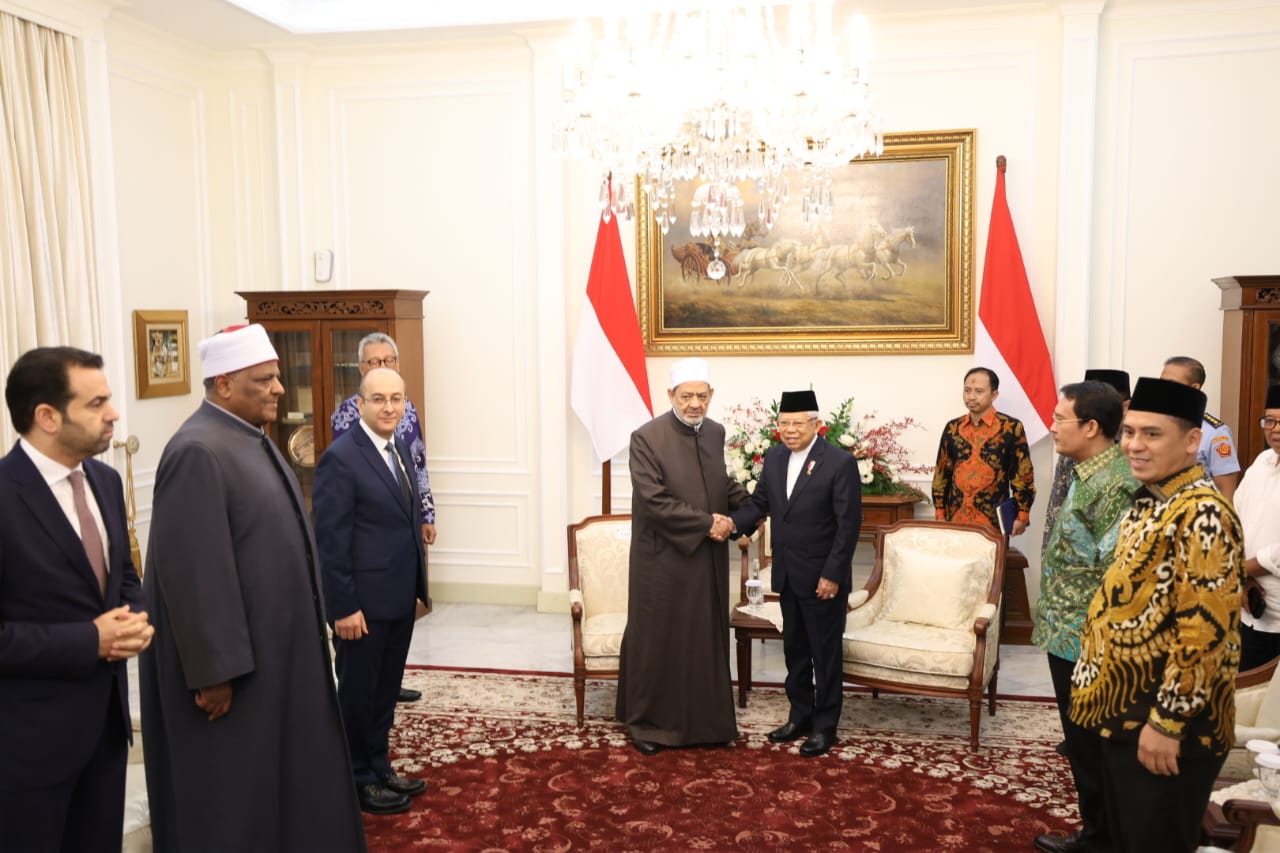GI meets with Indonesian Vice-President to discuss ways to combat the rise of Islamophobia
Our Islamic world lacks coordination of efforts and a unified Islamic voice in which political decision-makers and religious scholars participate, Al-Azhar Grand Imam to Indonesian Vice-President
Efforts to combat Islamophobia will only bear fruit if driven by genuine desire and coordination between politicians and religious scholars, Al-Azhar Grand Imam
We coordinate with Al-Azhar to combat Islamophobia and explain the moderation of Islam to the West, Indonesian Vice-President
Vice President of Indonesia, Dr. Ma'ruf Amin, received His Eminence the Grand Imam of Al-Azhar Al-Sharif and Chairman of the Muslim Council of Elders (MCE), Prof. Ahmad Al-Tayyeb, at the Indonesian Presidency headquarters, to discuss ways to enhance cooperation in confronting the growing phenomenon of Islamophobia.
Dr. Amin welcomed the Grand Imam of Al-Azhar to Indonesia, emphasizing the importance of His Eminence's visit to Indonesia. He stressed that Indonesian people hold the Grand Imam in high esteem and have great respect for Al-Azhar Al-Sharif, which enjoys the trust of Indonesians as their first religious authority. He added that Al-Azhar is one of the most important elements that shaped the relationship between Egypt and Indonesia, and pointed out his country’s efforts to raise the level of scientific relations with Al-Azhar by establishing an office for developing the education of Indonesian students to qualify them before they travel to study at Al-Azhar University. He stressed that Indonesia pays great attention to its Azhari students as they are the nucleus of future scholars and community leaders.
The Indonesian VP expressed his appreciation for the coordination efforts between the Egyptian Zakat and Charity House - the charitable arm of Al-Azhar - and the Indonesian Zakat and Charity Authority, especially with regard to preparing humanitarian aid convoys and relief supplies and sending them to the Gaza Strip. He stressed Indonesia's position in support of the rights of the Palestinian people, which was translated into action by raising awareness of the oppression, displacement, injustice, killing, and massacres faced by Palestinians in Gaza and presenting these issues at various international forums.
Dr. Amin stressed the need to continue working with Al-Azhar and the MCE to present the correct image of Islam globally, especially at a time when Islam is falsely accused of being a religion that calls for violence and extremism. He added that it is necessary to introduce the moderation and tolerance of Islam, and to explain its truth to Western youth, and to refute false allegations about it. He stressed the danger of the growing phenomenon of Islamophobia in Western countries, and the threat this poses to the security and stability of Muslim communities.
The Grand Imam, for his part, stressed Al-Azhar's constant endeavor to introduce the moderation of Islam. Al-Azhar and the MCE held rounds of dialogue between the East and the West and international conferences on the status of women in Islam, and other conferences calling for activating the use of the term "citizenship" instead of "minorities" and what this entails in terms of empowerment and equality for all without regard to religion, race, gender or color. Al-Azhar also presented the concept of positive integration between all citizens in each country, and cited the first Islamic state founded by the Prophet (PBUH) as an example in which the Prophet (PBUH) established brotherhood between the immigrants from Mecca to Medina (the Muhajirun) and the local inhabitants of Medina (the Ansar). He (PBUH) also established the first document that guaranteed the rights of all, which is the "Constitution of Medina"– the document that constitutes a purely Islamic position on the nature of the relationship between Muslims and non-Muslims, which is a relationship built on respect, friendliness, coexistence and integration.
His Eminence stressed that the Islamic world lacks coordination of efforts among its countries and institutions. It urgently needs a unified Islamic voice that expresses the challenges and crises it faces, in which political decision-makers, religious scholars and thinkers participate. He warned that the efforts made, no matter how great, will not be effective unless they are driven by a genuine desire for change, and this will not be achieved except through full cooperation and coordination among all, and that excluding one party has only resulted in more dispersion and division, which makes it difficult for our Islamic world to return to the path of progress and prosperity.
